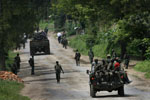
As deliberations over the future of the U.N. peacekeeping mission in Congo, or MONUC, continue among Security Council members, a nearly 200-page report by Human Rights Watch released Monday documents just what human consequences are at stake. The comprehensive report unflinchingly details countless horrors, violent killings, rape and inhumanities, that were committed by both the Congolese army (at times with the operational support of MONUC) and the Hutu militia group it seeks to dislodge, the FDLR.
Adding to the controversy around MONUC’s role are the internal U.N. legal memos published by the NY Times last week that reveal that U.N. peacekeeping officials had foreseen the possibility of being entangled in human rights abuses if they supported Congolese military operations.
Discussions around MONUC’s mandate renewal have focused on Congolese President Joseph Kabila’s request to accelerate discussions around drawdown but the evidence amassed by HRW makes clear the urgent need for effective civilian protection in eastern Congo.
To his credit, Secretary General Ban Ki-moon took pains to acknowledge the humanitarian disaster that was created with MONUC’s help in his recent report and said that civilian protection would remain the top priority in the mission’s mandate as well as in discussions with the Congolese government. Even in its continued assistance to Congolese military operations, MONUC would act under much stricter terms:
MONUC will not participate in or support operations with FARDC units if there are substantial grounds for believing that there is a real risk that such units will violate international humanitarian, human rights or refugee law in the course of the operation.
These moves to clarify MONUC’s role in future military operations are important and necessary. Without a clearly laid out standard of when MONUC can offer operational support, it will continue to be faced with impossibly contradictory objectives—charged at once with protecting civilians and supporting operations that target the innocent—and ultimately abet the deterioration of a humanitarian situation it was sent to alleviate. The responsibility to put this standard into practice now rests with MONUC leadership, who have until now been very reluctant to acknowledge much less condemn the serious abuses that Congolese forces have committed while conducting joint operations.
One recommendation from HRW calls for a Civilian Protection Expert Group that would inquire into and report on civilian protection needs and challenges, thus creating an independent monitoring body who will act as a defendant of international humanitarian law. Whatever is ultimately implemented, we hope that the lives and rights of civilians remain high on the minds of the Security Council and Congolese government as the two parties move towards a decision on MONUC in the coming months.
David Sullivan contributed to this post.
Photo: Fighting in Congo. (AP)

